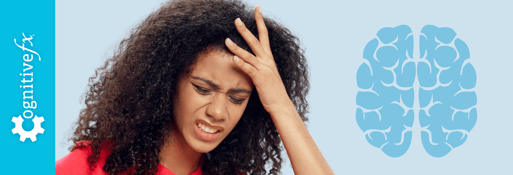Memory loss is a common concern among individuals of all ages, ranging from mild forgetfulness to more serious cognitive decline due to conditions like Alzheimer’s disease. Fortunately, there are various simple and effective solutions that can help improve overall cognitive function and quality of life. In this article, we will explore the importance of attention exercises in memory improvement, along with a range of encoding strategies and compensatory strategies to support memory retention and healthy brain function in daily life.
At Cognitive FX, we treat patients suffering from the long-term effects of concussions and other brain injuries. If you’re experiencing memory problems after a head injury, contact our team. We can help. Over 90% of our patients experience significant symptom improvement.
The Link Between Attention and Memory
Before delving into memory enhancement techniques, it's essential to understand the intricate relationship between attention and memory. Attention serves as a foundation for memory formation and retrieval. In fact, some research indicates that attention can predict up to 50% of memory. When we pay close attention to information, it becomes more effectively encoded in our memory, making it easier to recall later.
Attention Exercises for Active Recovery
Enhancing attention through targeted exercises can significantly contribute to improved memory function and problem-solving skills. Here are a few attention exercises that can aid in active recovery:
- Attention Shifting & Alternating Attention: This exercise involves combining a physical task with a cognitive task simultaneously. For instance, while folding laundry or doing dishes, engage in a conversation with a loved one. Alternatively, you can take a phone call or practice a word-finding exercise. This exercise challenges your brain to seamlessly shift between different tasks, promoting cognitive flexibility and multitasking skills.
- Sustained Attention: Sustained attention exercises focus on extending your concentration span over time. Choose an activity that requires your complete attention, such as reading a book, working on a puzzle, or practicing a musical instrument. Start with a manageable duration and gradually increase the time you spend on the task. This exercise aids in improving your ability to stay focused on a single task for an extended period.
- Selective Attention: Selective attention exercises involve performing a task while intentionally incorporating background distractions. For example, you can work on a project while listening to music or a podcast. Ensure that the distractions are deliberate and not overwhelming. This exercise helps you filter out irrelevant stimuli while maintaining concentration on the task at hand.
Important Note: While distraction suppression exercises are effective for practice sessions, they might not be suitable for performance situations such as work or important meetings. During performance situations, we recommend limiting potential distractions.
By incorporating these attention exercises into your routine, you can foster active recovery and strengthen your cognitive capabilities. Remember that like any form of exercise, consistency is key. Gradually increase the complexity and duration of these exercises to continuously challenge your attentional abilities. Over time, you'll likely notice improved attention, enhanced memory, and a heightened sense of mental clarity.
Encoding Strategies
Improving memory retrieval can be achieved through the application of various powerful memory encoding strategies.
- Write It Down: Transcribing thoughts can facilitate better memory retrieval. (Writing pen on paper, in cursive, is more effective than typing.)
- Create Narratives: Crafting stories to interconnect memories can amplify retention.
- Categorization: Grouping akin elements together aids in memory consolidation.
- Mnemonic Tools: Utilizing acronyms, songs, and rhymes can significantly augment memory.
- Teaching Others: Explaining newfound knowledge to others cultivates stronger memory retention.
- Visualization: Creating mental snapshots of objects and their locations improves recall.
- Repetition Strategies: Engaging in repeated recitation, capitalizing on the phonological loop, enhances memory.
- Information Chunking: Breaking down content into manageable segments facilitates memorization.
- Associative Techniques: Thinking of connections between new information and pre-existing knowledge fortifies memory recall.
Incorporating these memory-boosting methodologies has the potential to significantly enhance the way your brain encodes and stores memories, making them easier to retrieve later on.
Compensatory Memory Strategies
While attention exercises and encoding strategies are crucial for memory improvement, incorporating compensatory strategies into your daily routine can provide additional support for memory retention. Compensatory strategies are practical techniques that help you work around challenges with working memory and long-term memory by implementing structured approaches. Here are some effective compensatory strategies to consider:
- Daily Planner: Maintain a daily planner or digital calendar to organize your tasks, appointments, and commitments. Regularly updating your planner ensures that important information is readily available, reducing the likelihood of forgetting crucial events.
- Weekly Planning: Set aside time each week to plan upcoming activities and responsibilities. By visualizing the week ahead, you can allocate time effectively and allocate specific slots for memory-intensive tasks.
- Checklists for Cleaning: Create checklists for cleaning each room of your house. This strategy not only ensures that you don't overlook any cleaning tasks but also minimizes mental strain by relying on a visual guide.
- Morning and Evening Routines: Develop morning and evening routine checklists. These lists serve as a step-by-step guide to your daily rituals, helping you maintain consistency and freeing up cognitive resources for other tasks.
- Exit Checklist: Place a checklist on your door containing items you need before leaving the house, such as keys, wallet, and phone. This practice reduces the chances of leaving essential items behind and minimizes last-minute stress.
- Designated Exit Box: Keep a box near your exit where you store items required before leaving the house. Designate this spot for essentials like keys, sunglasses, and important documents. This strategy creates a designated home for these items, making them easier to locate.
Note: For those who are not able to encode new declarative memories, a learning strategy called “errorless learning” can help individuals encode new procedural memories.
Holistic Approach for Optimal Results
Enhancing memory function is best approached with a holistic mindset that combines attention exercises, encoding strategies, and compensatory strategies. By improving your attention, you lay a strong foundation for effective memory formation. Simultaneously, employing compensatory strategies reduces the reliance on memory alone, ensuring you stay organized and on top of daily tasks.
Remember that consistency is key. Gradually incorporate these techniques into your routine and adjust them to suit your individual preferences and needs. As with any cognitive improvement endeavor, patience and persistence are essential. Over time, you're likely to notice significant improvements in your memory recall and overall cognitive function. Make sure to include a variety of exercises to bolster different types of memory.
It’s also important to look at parts of your life you might not immediately associate with memory:
- Do you get enough sleep?
- Do you have any underlying medical conditions such as high blood pressure or poor thyroid function that could impact your cognitive abilities?
- Have you met with a health care provider about these health conditions?
- Are you taking any supplements or medications, such as antidepressants, with side effects that could impact your cognitive function?
- Do you follow a healthy diet that can reduce the risk of dementia or mild cognitive impairment?
- Do you engage in sufficient physical activity for healthy blood flow in your brain and body?
Anyone with memory loss can benefit from a comprehensive look at lifestyle, mental health, and age-related causes with a knowledgeable physician.
In conclusion, memory loss is a common concern, but it's not an insurmountable challenge. By integrating attention exercises into your routine and implementing practical compensatory strategies, you can enhance your memory and enjoy a more organized and fulfilling life. Embrace these simple solutions and take proactive steps toward optimizing your brain health.
Meeting with a certified Speech Language Pathologist (SLP) who specializes in neurocognitive rehab can help you discover which strategies are most effective for you and customize them for application in your everyday life. Additionally, your SLP can help you to identify and implement active attention exercises that can help you in your journey to improve your cognitive functioning.
At Cognitive FX, we treat patients suffering from the long-term effects of concussions and other brain injuries. If you’re experiencing memory problems after a head injury, contact our team. We can help. Over 90% of our patients experience significant symptom improvement.









